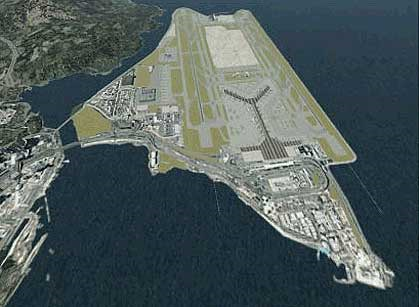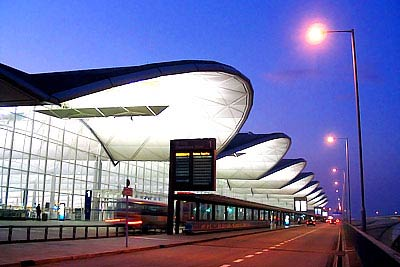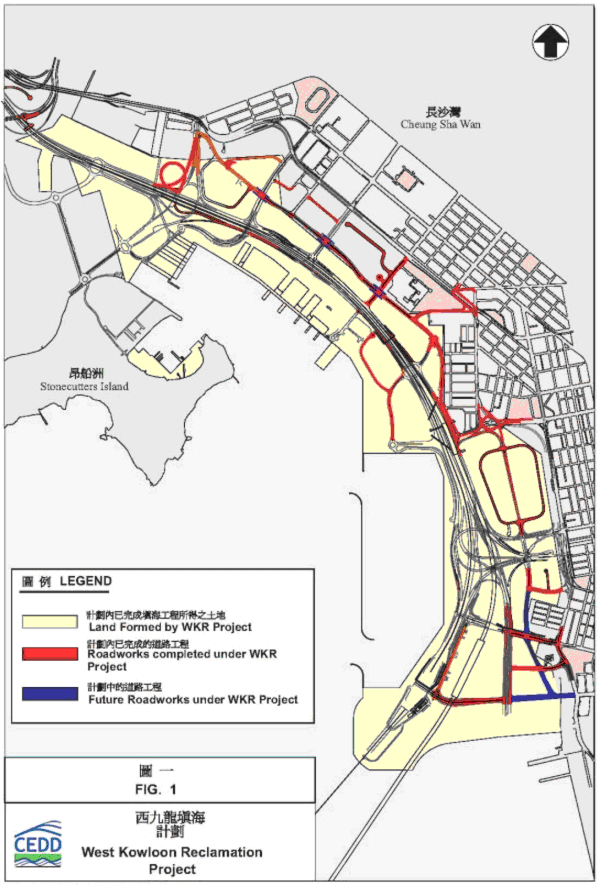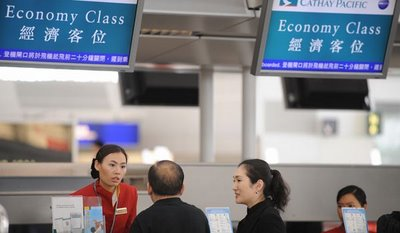Abstract
One of the greatest assets of China is its unbelievable power of imagination. It has helped them to create a number of things that the rest of the countries would have been going to for another thousand years. The most impressive inventions have been made here; these are compass, powder, paper and typography. This is a country of architects, since they have built not only the Great Wall of China, but also numerous palaces that bear only a slightest resemblance to the European ones. And it’s no wonder that one of the most beautiful airports has been built exactly here.
What makes people sour high as a bird? Is this the feeling that we should have been born with wings? Or do people want to abandon the earth with its miseries and reach heaven or at least what is given there for heaven? No one knows that for sure. But since people have created the steel birds to ride, they started making shelters for their new “pets”.
Among all existing, Chek Lap Kok Airport is one of the most impressive ones. A wonder of technique and design, it looks right decent to serve as a shelter for the metal beasts. (Blow 73)
There is something particularly special about this building. Big as it is supposed to be, it is still elegant and somewhat stylish, which is the best thing that the designers could have provided for the building. However, let us talk the story as it goes.

The famous invention of the XX century, the airport of Chek Lap Hok was built in the distant 1925. In those times, it was more than the product inspired by the new technological inventions. The scale of the project could be compared to building the pyramids. It involved the latest technical gadgets and tools, and the design was supposed to surpass the beauty of a king’s palace.
Chek Lap Kok Airport from above
First located in the Kowloon city district, which lacked the room and had a single runway, it was looking like a giant trapped in a rabbit hole. The airport needed some air, if you excuse me fro a tautology. So in 1990ies it was suggested that the airport should be relocated. However, the place where the airport was transferred to was the least expected one you could have thought of. Again, only the Chinese could have built an airport, a place that connects the earth and sky, in the middle of an ocean…
The airport is situated on an island, of Chek Lap Kok, which gave the airport its name and suggested a big area of a peculiar shape to build it on. The sialnd, as if cut with a knife into a weird patch, is shaped into a huge plane, which can be seen only from the bird’s-eye view.
Even though it already makes a pure miracle that an airport can be situated on an island and that it can take the whole island, there are still a lot of things to be astounded with.
To start out, the size of the building and its all premises is tremendous. Like a dinosaur cannot be compared to an ant, the Chek Lap Kok airport cannot stand the comparison to the rest of the buildings or even other airports. Its area is huge, 12.48 km2. To draw a parallel, the total area of Liechtenstein is 160,475 m2, so imagine how many Liechtensteins it would take to make the Chek Lap Kok airport. It sounds incredible, doesn’t it?
The premises have enough room to accommodate a small country. This was a breakthrough in the architecture technologies, and the project was one of the most risky ever undertaken. Still the multiple doubts proved wrong, and what we can observe now is the triumph of design and architecture.
It does seem a little awkward and weirdly giant for the world squeezed between the small one-storey buildings, but if you take a look at it from the distance, you will surely notice how elegant and refined it looks, the modern style expressed with such a taste that it seems no longer rough and metal-cold.

Its lights create the atmosphere of the place where you are always welcome and long awaited. Yet it suggests the modern facilities that every high-ranked airport can suggest. That is definitely a place to long for after a tiring journey back home.
The people who have created it deserve being praised as the most outstanding engineers of our times (Ho 62). The peculiarity of the Chinese people is that they manage to combine a deep and profound philosophy and a totally new approach. They both pay the greatest tribute to their traditions as all Asian people do, and yet they add a tint of the epoch the rest of the world lives in, so that the work would not seem a stranger in here. That is what they have actually done to the building. It is completely new, yet preserving the fleur of the Chinese wisdom.
Why is that so? What are the Chinese so special about and what kind of secret do they know that has helped them to pull such a rabbit out of their hat? – Perhaps, it is their philosophy that makes them such amazing designers. After all, it an old Chinese proverb says, “If you want to know things, build a ship”. Following their eluding wisdom, it must be that if you want to know people, you must build a place for them to return from their adventures and travels. Build an airport…
With the history of several thousand years and the experience gained both in the economical and political relationships with the other states established on the highest level of politeness and courtesy, the Chinese people have all grounds to consider themselves the country of the richest traditions and experience. Their culture dates back to the times immemorial, and they have brought the fire of their enlightenment burning through the centuries and millenniums. They have created a philosophy that views the world as something completely unknown and yet suggesting its hidden treasures to the traveler attentive enough.
The core idea about the Chinese philosophy is that they tend to transfer the things they have been given by the Mother Nature into a work of art and a masterpiece. The hundreds of schools of thought have made the Chinese the people with the richest worldview, yet this nation is considered the most humble and reserved one along with the Japanese. That is a part of the Eastern philosophy as well. They aim at achieving the result, and what happens in between the work is just the notes a traveler takes on his journey to the promised land.
The Chinese idea of beauty contrives to convey both the concepts of the Eastern world and the ideas of the West that top the whole construction making it perfect. It resembles a flower, the beauty of which is a pure philosophy that does not need analyzing.
As we know, the head ideas of the Chinese wisdom are the following: Tao, which stands for the way, or the doctrine a person keeps to and thinks the way that is going to lead him to the highest state of soul; De, that covers the virtues and the power a man has to possess to become spiritually enlightened; Li, the principles one is to adhere to in case he does not want to miss the chance to lead a holy and pious life; Qui, which is can be either the vital energy or the material force that keeps a man on the run, not letting him loosen the grip and cut on his religious behaviour and state of soul; and, finally, and, the last but far not the least, the Taiji, the unification of the two polar notions, the feminine and the masculine principle. The last one is the final stage of the meditations that must purify the soul and bring a man to the state of utter bliss and blessedness. This was what they involved as they were working on the Chek Lap Kok Airport.

They have brought the harmony of earth and air together, the steel providing a solid fundament and frame for the whole construction, and the glass and lights creating the gorgeous look that makes people gasp with delight.
The hidden force within is something that characterizes the Chinese philosophy at its utmost. They make it peak so that they could create something really outstanding, and that is what they achieve after long time of training, both bodily and spiritually.
The culture of theirs, a thing in itself, is rather stable. They are not afraid of catching a virus of another culture that is way different from theirs, but the Chinese manage to take the best of the foreign influence.
This very peculiarity has drawn them to creating the Chek Lap Kok Airport, a link to the outer world, full of new ideas and the wisdom to discover.
The building of the century was about to begin.
However, this is the thing that is far easier to say than to make, and the whole process took a great deal of pains and efforts from its constructors and the engineers. First, there were lots of sketches of how it should look, and the architects could not come to a certain conclusion.
Still it is a miracle that such a tremendous system, not even a building, could be created in less than two years and a half.
Unlike the characters of an old tale, the architects bothered themselves with the problem of the extra durability of the airport. That meant the materials in use had to be both light, so that the construction would not seem very heavy and bulky, and that the elegance of the design must not affect the construction and decrease the number of the elements included. The Task seemed impossible to put to practice, since the ways of designing used in XX century did not include the structures that are in active use now, and thus something had to be done about the contradicting issues.
However, the numerous questions the designers kept asking themselves were solved step by step. To start with, the material they used was a special kind of concrete that could endure very severe conditions and stay in its original form despite the attacks from the outside. These could be heat, freeze, water, fire etc…. No one could enumerate beforehand the possible accidents that could happen. With such a risky and completely new project everything was plausible and any danger was taken into account as a real one.
It was the precast and prestressed concrete that was used during the building of the airport. The specific feature about the concrete was that it could endure the high temperature and are a soundproof material, so the people in the terminal will not hear the deafening roar of the landing plane. Defined as a superstructure, this material guaranteed the safest environment for both the staff and the people waiting for the plane arrival in the waiting room.

The methods the airport was built deserve a close attention, too, for they were a brand new feature of the XX century architecture. Since the precast concrete was in use, the method that the workers applied was the one called “precast girders with cast-in-situ slab”. The strange-sounding name meant that the workers and the engineers used the concrete that cast faster and the material they finally got was times harder than the usual concrete, which allowed working quickly and at the same time at the top quality. It was the optimum solution for the building of this kind, the scale unbelievably high and the ambitions of the engineers and constructors raised at the top.
The whole process involved both marine and land operations, which took a lot of pains from the workers and needed the specific equipment to work in the depth of the ocean. (Lay 55)
It is also important to mention the equipment that was used during the process of installing the building. These were the ancillary equipment that helped to sustain the changes already applied. It was also the drilling and mining equipment that was used to create the building according to the design. It is impossible to overstate the value of the water quality monitoring system that was of vital importance to the people working on the building. It provided a quick cleaning of the water and coordinated its height and pressure. One can say that everything depended on its working correctly and precisely. The aim of the monitoring was “to measure a range of water quality parameters’, which helped detecting the changes that had some impact on the marine works held. (Plant 116)
There was also the tool, called the marine growth control equipment. The aim of this tool was to register the changes that occurred as the work went on and give a signal in case something was going wrong. That was the kind of tool that provided a safety in the workplace and at the same time was used for measuring the specific data that was changing each and every moment. The situation was rather tense and at times the workers were not able to take the environment any longer.
However, at times the amount and the size of the tools used were impossible to record anyway. It was either too secretive, or there was no recording of its usage. As a rule, the building of such places requires that the information about its being constructed was kept back as long as possible. In fact, the equipment described is far not the only used, but the company keeps its mysteries well enough.
Now I suppose you would like to know who the people to build it were. The engineers are always sure to think that their names will not escape people’s memory, but those who took the hardest work to cope with will always remain unknown. that sounds way too unfair for me, and that is why I would like to say a couple of words about the workers who created the magnificent airport.

Norman Foster the architect, who conducted the process, was the leader in this venture. Those who were the labor force were both the local people and the specialists form the foreign countries. The total count was 600 people, and that made the labor force engaged into building the airport. The number of professionals engaged was huge as well, all of them working over the project. That was the project that literally brought together not only the people of China, but the people of the other countries as well. The teamwork achieved was a great importance for the future of the project. (Zhang 57) The building was shaping day by day, and finally it took the form of the most beautiful building the mankind has ever created. That could be named the achievement of a lifetime.
Although the airport was built relatively not so long ago and the methods that were used to created it were brand-new at the very moment the building began, it still seems to me that with the modern technologies that we can use today, it would still look a bit different if the building were constructed today. The Chinese infrastructure of roads and terminals is superior at present, but things could change at any moment.
First of all, it would use the minimum of materials, as this is the idea of the XXI century buildings to take as less as possible and yet to create an original structure that would set people’s imagination on fire.
Then, the shape would not be that futuristic-looking, for the today ideas of architecture tend to be as close to the natural shape as possible, and this would probably mean that the airport would take a shape of a big box. It would be merely a rectangle.
Then, speaking of the materials that the airport would be built of, I would say that theses could be concrete as well, but the modern technologies have already made it twice as durable as it was before, and the way it fixes represent a breakthrough in the architecture, for the time needed for that is minimized to several minutes. That would make the time the building could take much less than two years and a half, the original term for the Chek Lap Kok airport building.
And, finally, it seems to me that built today, it would take much more from the European culture than the original one did, and that would make the airport not so distinguished and would deprive it of its amazing look. The Europeans just could not think to build it on an island, and give it so much air. To sum up, the airport would possess te treats of the European civilization, namely the western one, and the originality of the Chinese would turn into the originality of the Europeans.
However, it is necessary to admit that the technical parameters of the airport would not be harmed in this way; on the contrary, they would be improved. It is all the design that becomes more usual and with the national traits erased. That is what the merging of the nations and the globalization take.
Reference List
Blow, Christopher J. Transport Terminal and Modal Interchanges: Planning and Design. Olympia, WA: Elsevier, 2005.
Ho, Ken K. S., K. S. Li. Geotechnical Engineering. Meeting Society’s Needs. New York, NY: Taylor and Francis, 2001. Print.
Lay, David. Millionaire Migrants. Trans-Pacific Life Lines. New York, NY: John Wiley and Sons, 2010. Print.
Plant Graham W., Craig S. Covil and Robin A. Hughes. Site Preparation for the New Hong Kong International Airport. New York, NY: Thomas Telford, 1998. Print.
Zhang, Amning. Air Cargo in Mainland China and Hong Kong. New York, NY: Ashgate Publishing, 2004. Print.